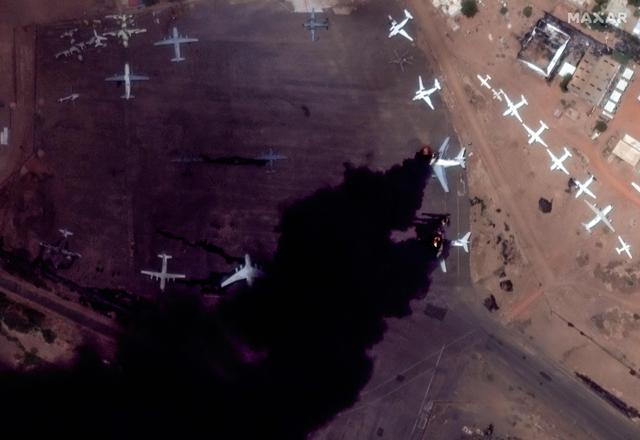You are here
Sporadic gunfire dents Sudan ceasefire as evacuations intensify
By AFP - Apr 26,2023 - Last updated at Apr 26,2023

A passenger bus drives along a desert road at Al Gabolab in Sudan's Northern State, about 100 kilometres northwest of the capital, on Tuesday (AFP photo)
KHARTOUM — Sporadic gunfire rang out in parts of the Sudanese capital Khartoum Tuesday despite a US-brokered agreement between the warring generals to cease fire for 72 hours to pave the way for talks on a more lasting truce.
Ten days of heavy fighting, including air strikes and artillery barrages, have killed hundreds of people, many of them civilians, and left some neighbourhoods of greater Khartoum in ruins.
But in other areas there has been a reduction in the intensity of fighting since foreign governments scrambled road convoys, aircraft and ships to get their nationals out since the weekend, witnesses said.
Unconfirmed video posted on social media showed bewildered civilians walking down one street in Khartoum North where virtually every building was bombed out and smoke was still rising from the scorched ruins.
The Sudanese Armed Forces and the paramilitary Rapid Support Forces (RSF) agreed to the ceasefire “following intense negotiations”, US Secretary of State Antony Blinken said in a statement shortly before the truce took effect at midnight (2200 GMT Monday).
Previous bids to pause the conflict failed to take hold, but both sides confirmed they had agreed to the three-day halt.
“This ceasefire aims to establish humanitarian corridors, allowing citizens and residents to access essential resources, healthcare and safe zones, while also evacuating diplomatic missions,” the RSF tweeted.
In a statement on Facebook, the army said it would abide by the ceasefire on condition its rivals did so.
The RSF accused the regular army of breaking the ceasefire by keeping its aircraft, which have carried out devastating strikes over the past 10 days, in the skies over Khartoum.
‘Edge of abyss’
At least 427 people have been killed and more than 3,700 wounded, according to UN agencies. More than 4,000 people have fled the country in foreign-organised evacuations that began on Saturday.
UN chief Antonio Guterres on Monday warned that Sudan was on “the edge of the abyss” and that the violence “could engulf the whole region and beyond”.
The fighting has pitted forces loyal to army chief Abdel Fattah Al Burhan against those of his former deputy Mohamed Hamdan Daglo, who commands the RSF.
The RSF emerged from the Janjaweed militia that then-president Omar Al Bashir unleashed in the Darfur region two decades ago, leading to war crimes charges against Bashir and others.
The Forces of Freedom and Change, the main civilian bloc which the two generals ousted from power in a 2021 coup, said the truce would allow for “dialogue on the modalities of a permanent ceasefire”.
The United States and European, Middle Eastern, African and Asian nations launched emergency operations to bring to safety their embassy staff and Sudan-based citizens by road, air and sea.
But millions of Sudanese are unable to flee the country, which has a history of military coups. They are trying to survive acute shortages of water, food, medicine and fuel as well as power and Internet blackouts.
Britain requested an emergency UN Security Council meeting on Sudan, which was expected to take place Tuesday, according to a diplomat.
Shortly after the ceasefire took effect, Britain announced it had launched “a large-scale evacuation” of its citizens trapped in Sudan.
Britain had faced pressure to act after comparisons to the chaotic evacuation of Britons after Afghanistan’s Taliban took control of Kabul in 2021.
“The government has begun a large-scale evacuation of British passport holders from Sudan on RAF [Royal Air Force] flights,” Prime Minister Rishi Sunak said. “Priority will be given to the most vulnerable.”
Britain already carried out an operation Sunday to withdraw its diplomats. But, citing the dangers on the ground, it had held off on extracting its citizens more widely despite Western allies evacuating hundreds of their own passport holders.
Foreign Office minister Andrew Mitchell said some 2,000 Britons had registered with the ministry seeking help.
‘Unspeakable destruction’
The capital, a city of five million, has endured “more than a week of unspeakable destruction”, Norway’s ambassador Endre Stiansen wrote on Twitter after his evacuation.
A UN convoy carrying 700 people on Monday completed an arduous 850 kilometre road trip to Port Sudan on the Red Sea coast from the capital.
The United Nations head of mission Volker Perthes said the convoy arrived safely. A UN statement said he and other key staff will “remain in Sudan and will continue to work towards a resolution to the current crisis”.
The military toppled Bashir in April 2019 following mass citizen protests that raised hopes for a transition to democracy.
The two generals seized power in the 2021 coup, but later fell out, most recently over the planned integration of the RSF into the regular army.
Experts have long drawn links between the RSF and Russian mercenary group Wagner. Blinken earlier on Monday voiced “deep concern” that Wagner risked aggravating the war in Sudan.
Related Articles
KHARTOUM — A wanted Sudanese war crimes suspect has confirmed that he and other members of the Islamist regime ousted in 2019 have escaped f
KHARTOUM — Thousands of residents fled Sudan's capital Wednesday as fighting between the army and paramilitaries, which has killed around 20
KHARTOUM — The Sudanese army pounded paramilitaries in the capital Khartoum with air strikes Thursday while deadly fighting flared in Darfur



















